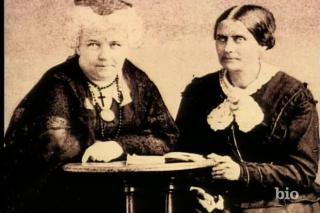Teacher. Abolitionist. Educational Reformer. Labor Organizer. Suffragist. Women’s Rights Pioneer. Temperance Worker. Civil Rights Leader. Author.

One of the most influential female advocates for Civil Rights was Susan B. Anthony. Through her tireless efforts, she championed for social justice, women’s rights, and the emancipation of slaves. This remarkable woman left a lasting legacy as a heroine for justice for all people of this nation, and her historical accounts have continued to inspire people in our country.
Born on February 15, 1820, Susan B. Anthony arrived in Adams Massachusetts. Her parents, Daniel and Lucy Read Anthony raised their daughter in a Quaker home, and the religious family believed that everyone was equal under God’s Laws. Her family worked together to support those beliefs through social reforms.
This woman came from a large family; she had seven brothers and sisters. Her father pulled his girls from school because her father did not believe the school could provide his children with a proper education, especially when a teacher refused to teach his daughter mathematics. Education was essential to the Anthony household. Schooling started early for this child, for she learned to read and write at the age of three.
At 17, Susan attended boarding school in Philadelphia; however, shortly after enrolling, her father was forced to remove his daughters from school. During the 1837 depression, her father, Daniel, declared bankruptcy. He lost his business, and the family lost their home in Battenville, New York.
For 15 years Susan taught school so that she could help her family with pay off debts and move to their farm near Rochester, New York. She quit teaching when her father asked her to return home and run the farm, so he could begin a new endeavor of selling insurance. During this time, many famous reformers would stopover at their farm to speak to Daniel, for his family became involved in the abolitionist movement. Some of these famous visitors included Frederick Douglas and William Lloyd Garrison. Speaking with her guests, Susan developed strong convictions on the issues of slavery, women’s rights, and temperance.
As a young teacher, this strong woman started a campaign for equal pay for women in Rochester. When she started teaching, women earned a fourth of what their male counterpart would take home. She was outspoken and called for equal education for women and Blacks.
By 1848, Susan dedicated her time and worked with the abolitionists and the temperance movement. That year, she structured the Women’s New York State Temperance Society.

In 1851, Susan attended an anti-slavery convention in Syracuse, New York. During this time, she met her life-long friend and fellow activist, Elizabeth Cody Stanton. Over time, this courageous woman became involved with the American Anti-Slavery Society. Her connection with this group angered many, and because of her beliefs, she often became the target of hostile crowds. Mobs threatened her life, she was hung in effigy, and at one time her image was dragged through the streets of Syracuse.
After attending her first women’s rights convention, she also started working for women’s rights. She was an outspoken advocate for women, and she was refused permission to speak at the Capitol and the Smithsonian in Washington. She did not allow this rejection to slow her efforts, for she started a women’s suffrage movement, and this strong-willed woman often traveled alone when she would attend speaking engagements.

In time, Susan and her friend Elizabeth Cody Stanton formed the National Woman Suffrage Association (NWSA). The friends worked tirelessly to support women’s rights and to champion the right to vote. She operated as the organization’s spokeswoman and served as its leader. In 1872, she cast a vote in the presidential election in Rochester. Later, she was arrested, convicted and fined. Of course, the outspoken women refused to pay the fine; still, the case against her did not proceed.
Although she was often met with angry protests, Susan tirelessly continued with her cause. In 1900, she retired from the position as president of the National Woman Suffrage Association. Sadly, she died in 1906, 14 years before the Nineteenth Amendment passed.
Susan B. Anthony dedicated her life to serving others as she worked to make this country a better place for all. Her outspoken beliefs supported equality for all citizens of this nation. Her dedication left a lasting legacy, and her heroic efforts changed our country.
Sources
- Britannica, The Editors of Encyclopaedia. “Susan B. Anthony.” Encyclopædia Britannica, Encyclopædia Britannica, Inc., 8 Mar. 2018, http://www.britannica.com/biography/Susan-B-Anthony.
- “Susan B. Anthony.” Biography.com, A&E Networks Television, 27 Feb. 2018, http://www.biography.com/people/susan-b-anthony-194905.
- “Susan B. Anthony | .” Biography Online, http://www.biographyonline.net/women/susan-b-anthony.html.
- “Susan B. Anthony.” Brooklyn Museum: Susan B. Anthony, Brooklyn Museum, http://www.brooklynmuseum.org/eascfa/dinner_party/place_settings/susan_b_anthony.
- “Susan B. Anthony Museum and House.” Susan B. Anthony House :: Timelines, National Susan B. Anthony Museum & House, 2018, susanbanthonyhouse.org/timeline.php.


Hello Ann Marie. Neat essay. I did not know much of this. I think I caught a printer’s typo though. I believe where it reads, “By 1948, Susan dedicated her time and worked with the abolitionists and the temperance movement.” you most likely intended it to read, “By 1848…” which would keep the action in the same century as dear Ms. Anthony. Don’t whip the printer too severely… 🙂
LikeLiked by 1 person
lol..nice catch….thanks…she was my 4th cousin…now I know where I get my strong willed streak.
LikeLike
I think this makes you a celebrity.
But in my book, you already were…
LikeLiked by 1 person
lol…too funny…
LikeLike